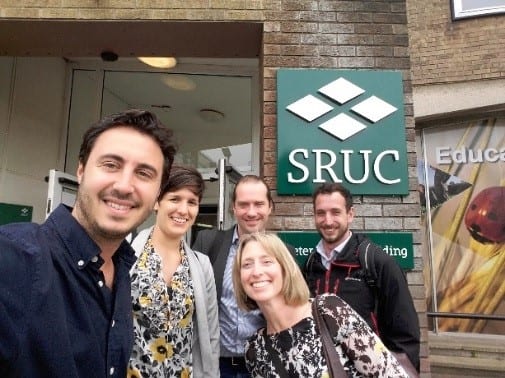
The role of antibiotic use in animals, particularly those in the food chain, is highlighted as an area needing focus and research to drive policy change. It is therefore essential to understand the true nature of antibiotic use across animal health if we are to undertake informed actions to reduce unnecessary prescribing of antibiotics and reduce the pressure for bacteria to become resistant to these medicines. To achieve this goal, it is vital to develop a comprehensive and accessible databank of veterinary data that includes information on antimicrobial use (AMU) and antimicrobial resistance (AMR).
Motivation
Our team is leading the UK veterinary science community by developing the first platform for livestock AMR research. We are drawing together information collected on cattle from many different sources – veterinary records, milk retailer data, findings from research studies and diagnostic laboratory results – into a database. We have access to surveillance data on AMU for over 50% of cattle in the UK.
Before the start of this project, following a series of successful AMR projects, we were already collecting data on AMU and AMR from > 100 UK dairy farms concentrated in South West England. However, we needed to extend this coverage to include cattle farms throughout the UK by collaborating with livestock diagnostic laboratories. Thus, the aim was to strengthen existing collaborations and foster new ones with a number of UK livestock diagnostic laboratories, to ultimately integrate their AMR data into our database.
Key objectives achieved
- Data sharing agreement signed with a major UK diagnostic laboratory
We signed a data sharing agreement with Farm Animal Diagnostics – Scotland’s Rural College (photo above) and integrated their AMR results for cattle into our growing database. Doing this threw up issues around data security, identifiability and ownership, especially in the wake of updates to the General Data Protection Regulations (GDPR). Because of these issues, we sought and were able to second a Senior Research Associate (Eleanor Walsh) to help us with the research governance of the database (including the ethical aspects). We have spent considerable time investigating GDPR and the impact it is likely to have on collaborators’ ability to process and share data for research purposes, which is still ongoing.
- AMR coverage extended by strengthening our collaboration with Farmvet Systems
Farmvet Systems (FVS) is the UK leading supplier of cloud-based data management technology for farm animal veterinarians and farmers. Thanks to this project, we were able to work closely with FVS to link their veterinary prescription data pulled out from several clinic management systems and their animal-specific indexed laboratory results captured by veterinarians/farmers participating through FVS’s smartphone apps. This work has allowed us to extend the coverage of our AMR data.
- Pilot data on AMR generated and used to support a grant application
We used descriptive statistics to summarise the newly integrated AMR data imported because of this project. Interestingly, data contained almost 4000 potentially zoonotic Enterobacteriaceae, more than half of which are AMR. The vast majority of these are multi-drug resistant E. coli, the largest bacterial killer of humans in the UK. These and other results from the project have been used to support a full Wellcome Trust (WT) Biomedical Resource and Technology Development grant application, as well as the rebuttal to our WT reviews. The committee evaluating our proposal is meeting in July this year, so wish us luck!
Looking ahead
We have plans to enlarge our current databank with broad and representative coverage of AMU and AMR across the UK cattle industry, with a view to expand to other animal species and human data to ultimately construct the world’s first comprehensive ‘research ready’ One Health resource for AMR.
Blog written by Fernando Sánchez-Vizcaíno, Kristen Reyher, Andrew Dowsey, Jon Massey, (Bristol Veterinary School) and Eleanor Walsh (Bristol Medical School), University of Bristol
This project was part-funded by the Jean Golding Institute Seed Corn Funding Scheme 2018. To find out about other projects supported by this scheme, take a look at the Jean Golding Institute Projects.

